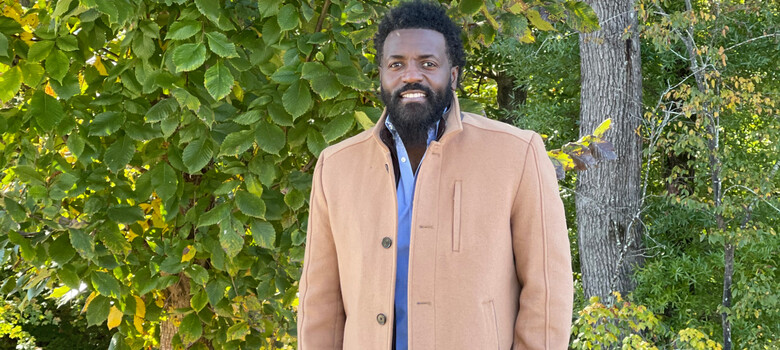Liver Transplant Saves Baby with a Rare Disorder

Gillian Noel, MD, shows her stethoscope to liver transplant patient, Noah Mann, as his mother, Talisha Becton (right), looks on.
Children younger than age one rarely have liver transplant surgery, which can be especially complex and risky in infants. But the parents of four-month-old Noah Mann knew that this was his only option. Born with a rare metabolic disorder that affects the liver and leads to the accumulation of ammonia in the body, Noah was at risk for developmental delays, brain damage, and death unless he had a liver transplant as soon as possible.
A Life-Threatening Condition
Talisha Becton was four months pregnant when she learned that Noah had ornithine transcarbamylase (OTC) deficiency, a rare genetic disorder that is severe in males. OTC deficiency prevents the liver from producing the OTC enzyme, causing ammonia to accumulate in the bloodstream. High levels of ammonia can result in permanent brain damage, coma, and death. Becton, the mother of three healthy children, had previously lost a son to OTC; she and Noah’s father, Terrance Mann, were devastated by the news.
The Only Hope for a Normal Life
From the moment Noah was born, Becton and Mann were vigilant about his care -- managing numerous medications, adhering to a complicated feeding regimen, and watching closely for any sign of ammonia buildup. Noah’s doctors advised them that the only cure for his condition was a liver transplant and referred them to Duke, one of the few centers in the region that performs the procedure on children so young. According to Gillian O. Noel, MD, MSc, a pediatric transplant hepatologist at Duke, “It’s very important that children with OTC deficiency are transplanted as early as possible so irreversible brain damage is avoided. It’s the only thing that would give Noah any semblance of a healthy, normal life.”
When Noah was two months old, Becton and Mann made the drive from their home in Goldsboro, NC to Duke for a full evaluation. Noah had been born seven weeks early; when he was evaluated, he weighed just nine pounds. Because he was so small, the surgery would be particularly risky. According to Debra L. Sudan, MD, a transplant surgeon at Duke Health who performed Noah’s operation, “Infants this small have blood vessels that are tiny and paper-thin. This means they have a very high rate of vascular complications just from the technical difficulty of the surgery.” Duke’s pediatric liver transplant experts accept patients like Noah, who might be turned away from other transplant centers. After a full evaluation, his name was placed on the national waitlist for organ donation.

Staying Healthy
Areeg Hassan El-Gharbawy, MD, DSc, a Duke pediatric medical genetics specialist, worked closely with Noah’s family to keep his ammonia levels under control until he could have surgery. “I was very honest from the beginning,” she said. “Outcomes of children with OTC deficiency depend in large part on the parents. We are a team.” She made it clear that if Noah had had any sign of illness, he should be seen by a doctor immediately. Becton and Mann followed her advice closely, and although Noah suffered two episodes of elevated ammonia, they acted quickly to get him the care he needed. “They did everything right, which allowed him to stay healthy before transplant,” she said.
An Illness Before Surgery
Two months after Noah’s evaluation, the family got a call from Duke with the news that a liver had been matched to him. However, just the previous evening, Becton suspected Noah had elevated ammonia levels and had taken him to the emergency room. Other centers might have postponed the transplant because of his ER visit, but because time was of the essence, Drs. Noel and Sudan wanted to evaluate Noah themselves. “If you have active respiratory illness or an active infection, that greatly increases your risk for transplant-related complications, even death,” noted Dr. Noel. Noah was lucky. “Fortunately, the testing and evaluation showed he was fine for transplant,” said Dr. Sudan.

“His transplant went very well, and since then he has just blossomed.”
Gillian O. Noel, pediatric transplant hepatologist at Duke
Blossoming After Transplant
Despite all of the potential complications, Noah’s six-hour surgery was a success. “His transplant went very well, and since then he has just blossomed,” said Dr. Noel. Although Noah will need to take lifelong medications, his prognosis is excellent. Thanks to the careful attention of his parents and his medical team, Noah experienced no brain damage and is developing normally. His mother commented, “He acts like a normal baby. He has no delays with his motor or cognitive skills.”
Dr. Noel list the reasons for the good outcome. “Having him seen early, being aggressive in getting him listed, and following him closely all made a difference. We didn’t say no because he had recently been in the ER. And even though the family doesn’t live close and they have three other children, they were ready and willing to drop everything when they were called in for transplant. He's doing so well. Now he has the chance to become whatever he wants to be.”
Options for Children with OTC
Dr. El-Gharbawy explained that often in the past, children with OTC deficiency were given the option of a liver transplant only after they developed severe problems, leaving many with significant brain damage. While liver transplantation cures the disease, it cannot reverse injury to the brain. “Children like Noah are going to write the book about what happens if you transplant early. These genetic disorders in the past had tragic outcomes, but now there are options that allow for better treatment.”




